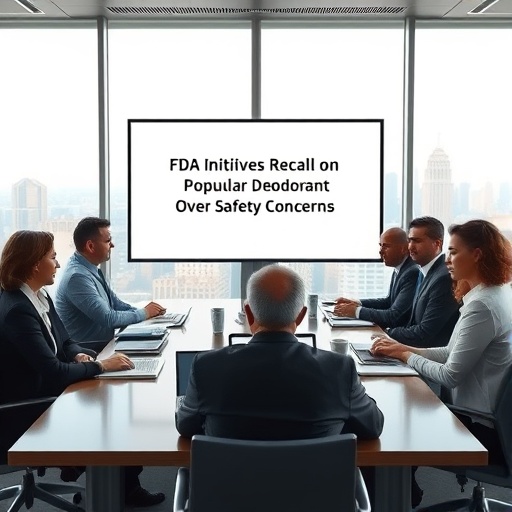In a move that has sent ripples through the personal care industry, the U.S. Food and Drug Administration (FDA) has announced a recall of a popular deodorant brand, citing safety concerns that have raised alarms among consumers and manufacturers alike. This development underscores the critical importance of stringent safety standards in the manufacturing processes of everyday consumer products, particularly those applied directly to the skin.
The recall, which was initiated following an extensive investigation by the FDA, pertains to specific batches of the deodorant that were found to contain trace amounts of a potentially harmful substance. According to the FDA, routine quality checks revealed the presence of benzene, a chemical compound classified as a human carcinogen. Benzene is associated with various health risks, including an increased risk of leukemia and other blood disorders, when exposed to high levels over prolonged periods. While the levels detected in the deodorant are relatively low, the FDA’s decision to recall the product reflects a precautionary approach aimed at safeguarding public health.
The deodorant in question has enjoyed widespread popularity, known for its effective odor protection and appealing fragrance options. Its recall has sparked a flurry of activity among retailers, with many pulling the affected product from their shelves to comply with the FDA’s directive. Consumers, meanwhile, are being urged to check their purchases and discontinue use of the product if it matches the recalled batches. The manufacturer, a leading player in the personal care sector, has issued a public apology and is cooperating fully with the FDA to ensure a swift resolution to the issue. The company has also set up a dedicated helpline to assist customers with questions and concerns, offering refunds or replacements for the recalled product.
This incident highlights the complex challenges faced by manufacturers in maintaining product safety, particularly in an era where transparency and consumer trust are paramount. The presence of benzene in the deodorant is believed to have originated from a contamination during the production process. Industry experts suggest that such occurrences, though relatively rare, underscore the need for robust quality control systems and rigorous testing protocols to detect and prevent contamination before products reach the consumer.
The recall also serves as a poignant reminder of the FDA’s pivotal role in regulating consumer goods and protecting public health. As the agency responsible for ensuring the safety and efficacy of a wide array of products, the FDA’s oversight is critical in maintaining industry standards and fostering consumer confidence. In recent years, the agency has faced increasing scrutiny and pressure to enhance its regulatory frameworks, particularly in the wake of several high-profile recalls across various sectors. The current recall of the deodorant underscores the agency’s commitment to proactive intervention and underscores the importance of vigilance in the face of potential health risks.
From a business perspective, the recall is likely to have significant repercussions for the affected manufacturer. Brand reputation, consumer trust, and financial performance could all be impacted as the company navigates this challenging situation. In an industry as competitive as personal care, maintaining consumer loyalty is crucial, and any perceived lapse in safety can have lasting effects. The company will need to act swiftly and decisively to reassure its customer base, address the root cause of the contamination, and implement measures to prevent similar incidents in the future.
Furthermore, the recall is a stark reminder to other manufacturers of the importance of adhering to best practices in production and quality assurance. In an increasingly globalized market, supply chains have become more complex, and the potential for contamination or quality issues has grown. Companies must prioritize investment in advanced testing technologies and maintain rigorous oversight of their supply chains to mitigate risks and ensure the integrity of their products.
As the situation unfolds, industry observers will be watching closely to see how the affected company handles the fallout and what steps the FDA takes to prevent similar occurrences. The incident underscores a broader trend toward heightened consumer awareness and demand for transparency in product safety. As consumers become more informed and discerning, companies must rise to the challenge of meeting these expectations while navigating the intricate regulatory landscape.
In conclusion, the FDA’s recall of the popular deodorant serves as a powerful reminder of the delicate balance between innovation, safety, and consumer trust in the personal care industry. It highlights the ongoing need for vigilance, transparency, and accountability among manufacturers and regulators alike. As the industry grapples with the implications of this recall, the lessons learned will undoubtedly shape future practices and policies, ultimately benefiting consumers and enhancing the overall safety of personal care products.

Leave a Reply